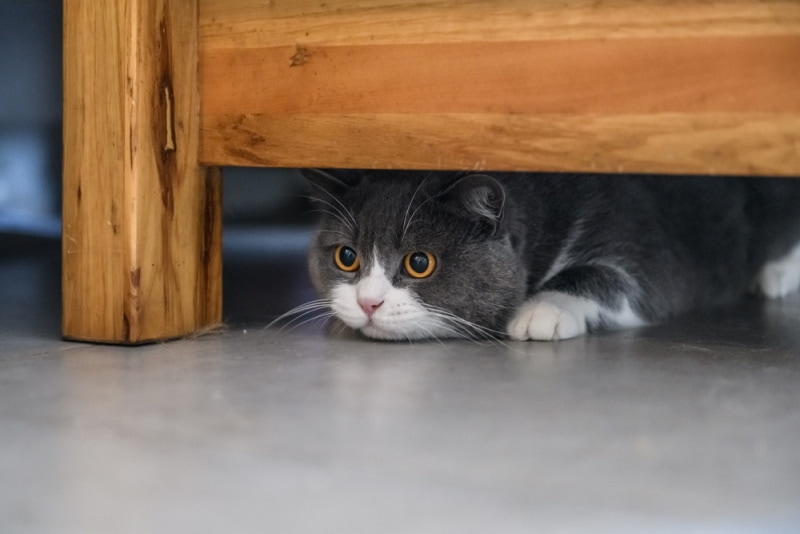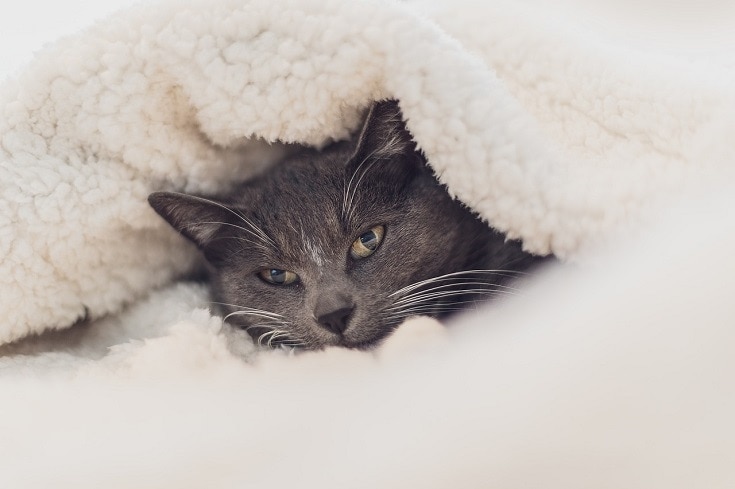Why Is My Cat So Jumpy All of a Sudden? 9 Vet Reviewed Reasons
Updated on

Click to Skip Ahead
It can be disconcerting for your cat to begin exhibiting new behaviors, especially if they suddenly become jumpy or fearful. There are multiple reasons that cats may suddenly become jumpy, though, and some of them are more concerning than others. It’s important to understand the potential reasons that your cat’s behavior has changed so you can start working toward making them feel safe and comfortable again.
The 9 Reasons Why Your Cat Is So Jumpy All of a Sudden:
1. Changes in the Environment
Cats are highly sensitive animals that can handle simple changes in their environment in unexpected ways. Cats may become jumpy because of something obvious—bringing home a new baby, moving to a new home, or replacing a large amount of furniture. However, they can also become highly stressed by changes that may seem very simple to us, like moving their litter box to a different room, hanging new curtains or blinds, or even changing their food.
Some cats will adjust to these changes over time, although they may need lots of reassurance in the meantime. For some cats, you may have to change things back to how they were before, assuming the changes are simple and won’t negatively affect the rest of the home.

2. Anxiety
There are many reasons that cats can experience anxiety, including separation anxiety. While separation anxiety is talked about far more frequently in dogs, this also occurs in cats. This can be exacerbated by things like returning to working in an office after you’ve worked from home for a long time or kids going to school for the first time, suddenly leaving your cat home alone for extended periods.
Over-the-counter calming supplements can help reduce this anxiety, as can behavior modification training and creating a set routine. Speak to your vet if you suspect your cat is experiencing separation anxiety; in some cases, it may require medical intervention by a veterinarian or certified behaviorist to manage.
3. Trauma
Just like in people who have experienced a traumatic event, cats may carry the stress of trauma with them for a long time. A home invasion, an injury, or getting lost can all be extremely traumatic events for a cat, leaving them anxious and jumpy for a long time afterward.
If something traumatic has happened to your cat, provide them with a safe space that is quiet and away from other stressors in the home, like other pets, children, and loud noises. If the jumpiness doesn’t seem to improve over time, contact your vet for help.

4. Mistreatment
While abuse is a known trigger for jumpy and fearful behavior in animals, there are other types of mistreatment that may not immediately click in our heads. Rough handling by children, for example, is an extremely stressful thing for cats, especially if the child is allowed to routinely handle the cat in an inappropriate manner. Mistreatment can also be regularly doing something that you know the cat doesn’t like, like touching them on their belly or sneaking up on them.
5. Age

Although age is not an illness, it can create some notable changes in your cat’s behavior. As your cat ages, their senses may begin to decrease, which can make them quite jumpy. If they’ve lost some of their hearing or vision, things that may not have surprised them before may suddenly be very startling, leading to stress and fear.
Cats may also experience discomfort as they age from age-related health conditions, like arthritis. When this occurs, your cat may become jumpy simply because they don’t understand why they’re uncomfortable. If your cat is older, and suddenly becomes jumpy, take them to your vet for a checkup, including things such as a retinal exam and blood pressure measurement.
6. Illness
Everyone can agree that being sick is the pits, and cats feel very much the same about this. The difference between cats and humans when it comes to illnesses, though, is that cats are excellent at hiding signs of pain, discomfort, and not feeling well. This can allow a cat to get quite ill before you even realize something is wrong. If your cat isn’t feeling well, they may get jumpy, especially since they’re not capable of fully comprehending just why they aren’t feeling well.
7. Injury or Pain

Injuries or pain from conditions like arthritis, as mentioned above, can be highly stressful for cats. Since they likely don’t understand why they’re hurting, it’s possible they may begin to associate things in their environment with the pain, creating stress and fear around those things.
For example, if it’s uncomfortable for your cat when you pick them up, they may begin to associate your handling them with pain, causing them to become fearful and jumpy around you. They can also become fearful if they experience an injury because of something in the home, like falling from a cat tree or being closed in a door, which can cause your cat to become highly reactive and fearful of the item.
8. Startling Events
Nobody enjoys being startled, and cats enjoy it even less than people do. Sudden startling events can occur in a variety of ways, which is part of what makes them unpredictable. Being startled awake by suddenly being handled can be scary for cats. Loud, unexpected noises, like fireworks or construction noise, can also startle your cat into a highly fearful state.
The jumpiness and fear associated with being startled are not likely to stick around, but if the event occurs multiple times, like another pet jumping out at them from behind a wall or door every day, then your cat may become jumpy in that part of the house, even when the other pet isn’t present.
9. New Pet

It can be hard for cats to adjust to a new pet in the home. Some cats may become highly territorial, with some showing overt aggression, but some cats can become very withdrawn and fearful when a new pet is added to the home. This is especially true if you add a larger pet to the home, like a dog or a larger cat.
The fear associated with a new pet is likely to wane over time, but you should also set up the environment to allow for safe, appropriate introductions between pets, allowing them to get used to each other’s presence and scent before they’re ever allowed to meet face to face.
How to Tell if Your Cat Is Afraid
Being jumpy and running from things that startle them aren’t the only ways that your cat will show you that they’re experiencing fear. Pacing, running, and restlessness are good indicators of fear, as well as notable pupil dilation and aggressive behaviors that are unusual for your cat. Some cats may tremble or pant, become excessively vocal, have accidents outside of their box, have a decrease in appetite, or express their anal glands, which you’ll notice when there is an unpleasant, fishy smell. Excessive grooming, sometimes to the point of losing fur, can also indicate stress and fear in cats.
While hiding is something that many people associate with fear, some cats may also freeze in the face of a scary situation. Just because your cat is sticking around doesn’t mean they aren’t afraid. Watch for other signs that your cat is stressed or afraid and provide them with comfort and praise to help soothe them.
Conclusion
While some of the causes of sudden jumpiness in cats are things that can easily be managed at home, others may require the help of a professional. The longer your cat is allowed to be stressed and fearful, the more likely it is that the fearful behaviors will stick around long term. Long-term stress and fear can cause your cat’s immune system to become deficient, increasing the risk of disease, and it can also lead to inappropriate behaviors, like peeing outside of the litter box, being destructive, or being excessively noisy.
Featured Image Credit: SakSa, Shutterstock













